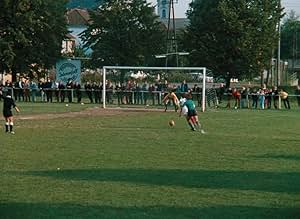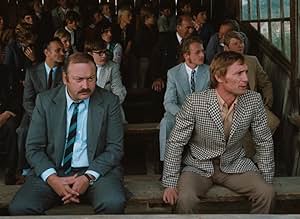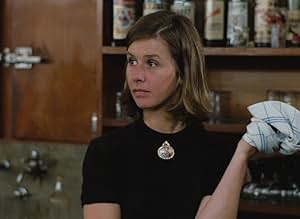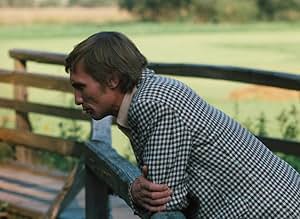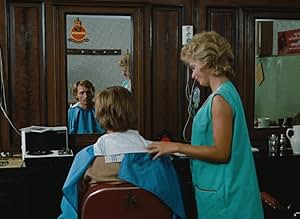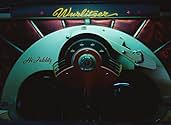VALUTAZIONE IMDb
6,5/10
2456
LA TUA VALUTAZIONE
Aggiungi una trama nella tua linguaGoalkeeper Josef Bloch is ejected during a game for foul play. He leaves the field and goes to spend the night with a cinema cashier.Goalkeeper Josef Bloch is ejected during a game for foul play. He leaves the field and goes to spend the night with a cinema cashier.Goalkeeper Josef Bloch is ejected during a game for foul play. He leaves the field and goes to spend the night with a cinema cashier.
- Premi
- 1 vittoria in totale
Monika Poeschl
- 1. Frisöse
- (as Monika Pöschl)
Recensioni in evidenza
Wim Wenders was always the most cerebral, the most cinematic of the three Giants of New German cinema (albeit Giants enough to bear favourable comparison even to cinematic Giants-For All-Ages such as Fritz Lang, and FW Murnau). In his hands, even a work so clearly of its maker as Ripley's Game became a perhaps even greater work, even more clearly of its maker such as The American Friend was, or as the Sam Shephard-scripted Paris, Texas was. And perhaps, too, this adaptation of a German bestseller likely is.
This film, despite the directors acknowledgements of the influence of Alfred Hitchcock - evident throughout - is A Masterpiece of control and content - admirable in a mature work by an established director, astonishing as a feature debut.
The title is relevant only in a later, casual, conversation the eponymous character has with a provincial policeman, where the policeman innocently spills out his m.o. when confronted by a criminal, but such is the nature of this study that we can't immediately be sure the psychopath is taking everything in. The murder itself isn't even shown in its grisly intensity, merely its foreplay and aftermath. And there's nothing to forewarn us of the killer's intentions: no taunting, no leering looks, no stalkings. (I saw parallels in the murder scene with a similar scene in Hitchcock's underrated 'Frenzy', but only in the way it was shot, and the aforementioned foreplay).
His scanning of every subsequent news report might suggest he's worried, that the noose is tightening around him. But his immediately subsequent actions suggest otherwise. Like the prototype psychopath, compassion is conspicuous by its absence from his every thought and action. But yet, in best cinematic tradition, what 'he' doesn't know is that we can see his every action, can scrutinise his every thought. Can condemn him for his indifference.
Only by giving every frame of this masterly film your full attention will you get to truly 'enjoy' its final frame.
The title is relevant only in a later, casual, conversation the eponymous character has with a provincial policeman, where the policeman innocently spills out his m.o. when confronted by a criminal, but such is the nature of this study that we can't immediately be sure the psychopath is taking everything in. The murder itself isn't even shown in its grisly intensity, merely its foreplay and aftermath. And there's nothing to forewarn us of the killer's intentions: no taunting, no leering looks, no stalkings. (I saw parallels in the murder scene with a similar scene in Hitchcock's underrated 'Frenzy', but only in the way it was shot, and the aforementioned foreplay).
His scanning of every subsequent news report might suggest he's worried, that the noose is tightening around him. But his immediately subsequent actions suggest otherwise. Like the prototype psychopath, compassion is conspicuous by its absence from his every thought and action. But yet, in best cinematic tradition, what 'he' doesn't know is that we can see his every action, can scrutinise his every thought. Can condemn him for his indifference.
Only by giving every frame of this masterly film your full attention will you get to truly 'enjoy' its final frame.
Spoiler alert, this is not a film about soccer at all, and there is no drama surrounding a penalty kick. Wim Wender's first film is a rather ponderous foray into the randomness of violence and suffering in the world. The anxiety here, the terror, is in just how senseless it is, as senseless as that goal scored while the goalie is barely paying attention in the opening scene. The anxiety is also in knowing that ordinary people wandering around have that in them, or could have committed such an act in the spur of the moment, and then gone on with their lives.
In addition to a critical point of violence that the film rests upon, we see smaller references, such as the goalie getting beaten up in the street a couple times, a reference to the murder of Sharon Tate, and a story in the papers is that a young boy has gone missing, presumably harmed. We see it in the goalie's case as being completely unplanned, which is shocking in itself, but it's also disconcerting when what follows is not a traditional crime drama, with a detective then trying to track him down. Life simply goes on.
In a minor key, I felt the usual kinds of questions, e.g. Will he do it again, and will he be caught, but those were not the main things causing tension. It was more like, why did he end up doing that to the young woman and not one of the other women he meets while traveling around? Does the world even care, listening to the buoyant music from the 50's and 60's? Is the veneer of civilization so thin that there are other sociopaths we see (in the film or in real life), who have done such things? These are haunting, existential questions. We wish for life to make sense and be fair, but oftentimes it is neither. Those big moments in soccer, or our favorite sports, as much as we get wrapped up in them - they seem trivial by comparison - but even there, we see randomness, the goalie guessing to dive left or right at the penalty kick.
I liked the concept for the film and how it managed such brutal statements about the world in such a low-key way, but I have to say, watching it was not terribly interesting. The dispassionate feeling of the killer and the disconnected events which follow don't make for a compelling story, and the film moves along very slowly. It doesn't escalate and there is little to no transformation, so what we're left with is this dark commentary, which felt as flat as it was depressing. It's worth seeing if you're a Wenders fan, but it's tough to recommend without reservations.
In addition to a critical point of violence that the film rests upon, we see smaller references, such as the goalie getting beaten up in the street a couple times, a reference to the murder of Sharon Tate, and a story in the papers is that a young boy has gone missing, presumably harmed. We see it in the goalie's case as being completely unplanned, which is shocking in itself, but it's also disconcerting when what follows is not a traditional crime drama, with a detective then trying to track him down. Life simply goes on.
In a minor key, I felt the usual kinds of questions, e.g. Will he do it again, and will he be caught, but those were not the main things causing tension. It was more like, why did he end up doing that to the young woman and not one of the other women he meets while traveling around? Does the world even care, listening to the buoyant music from the 50's and 60's? Is the veneer of civilization so thin that there are other sociopaths we see (in the film or in real life), who have done such things? These are haunting, existential questions. We wish for life to make sense and be fair, but oftentimes it is neither. Those big moments in soccer, or our favorite sports, as much as we get wrapped up in them - they seem trivial by comparison - but even there, we see randomness, the goalie guessing to dive left or right at the penalty kick.
I liked the concept for the film and how it managed such brutal statements about the world in such a low-key way, but I have to say, watching it was not terribly interesting. The dispassionate feeling of the killer and the disconnected events which follow don't make for a compelling story, and the film moves along very slowly. It doesn't escalate and there is little to no transformation, so what we're left with is this dark commentary, which felt as flat as it was depressing. It's worth seeing if you're a Wenders fan, but it's tough to recommend without reservations.
This is a detective film, but it's not really a film noir or cop drama like we're used to in the U.S. However, there are lots of references to America's overwhelming cultural presence throughout.
For me, Jurgen Knieper's score serves the story well; the tune still comes back to me all these years later.
It's a simple monotonous tune, the main parts being just two notes that the small chamber group works back and forth. It may not sound like much, but in reality it becomes mesmerizing, almost like a 2nd main character, and something that won't release you, like fate.
The film, of course, is genius.
The understated music matches the film's lack of much excitement or development.
The visuals and music work to produce a profoundly unsettling look at the monotonous life of the murderer.
For me, Jurgen Knieper's score serves the story well; the tune still comes back to me all these years later.
It's a simple monotonous tune, the main parts being just two notes that the small chamber group works back and forth. It may not sound like much, but in reality it becomes mesmerizing, almost like a 2nd main character, and something that won't release you, like fate.
The film, of course, is genius.
The understated music matches the film's lack of much excitement or development.
The visuals and music work to produce a profoundly unsettling look at the monotonous life of the murderer.
The Goalkeeper's Fear of the Penalty is a great title but an odd underwhelming film from Wim Wenders, his cinematic debut.
I only wish it was about a goalkeeper who went all wobbly when about to face a spot kick.
The film does display some of Wender's cinematic tastes. A liking of Americana, being on the road, a character being a person of few words maybe alienated and a languid pace. There is an existentialism about this film.
Joseph Bloch (Arthur Brauss) is a goalkeeper who gets angry when a goal is not called offside. It is a strangely shot sequence as Bloch does not concentrate on the play and makes no attempt to even save the shot. In fact we do not even see the build up to the play.
Bloch gets sent off and as his team was playing away, he makes his way to the city centre where he watches a film. Later he spends a night with the cinema cashier and he than strangles her. Bloch then leaves the city and spends times with an ex girlfriend in the countryside. Bloch constantly reads the newspaper to see what is happening about the murder, there is also a mute boy who has disappeared. Bloch spends time with his ex, listening to American rock n roll and getting involved in bar fights.
If Bloch is upset about the murder we do not get to know about it. The movie is bookended by a football match, at one point Bloch tells a spectator about the various thoughts that go through in a goalkeeper's mind when a penalty is about to be taken.
The lead character is an enigma, he goes about his normal life but he is a killer, maybe he has killed before, maybe he is a fantasist with his interest in American music and carrying US currency. It could just be that Bloch is contemplative about his existence.
In terms of tension, there is not much at all. Bloch gets on with his life, he is never in danger, no one is closing in on him. Critically lauded, age has not been kind to this film. Slow moving and boring.
I only wish it was about a goalkeeper who went all wobbly when about to face a spot kick.
The film does display some of Wender's cinematic tastes. A liking of Americana, being on the road, a character being a person of few words maybe alienated and a languid pace. There is an existentialism about this film.
Joseph Bloch (Arthur Brauss) is a goalkeeper who gets angry when a goal is not called offside. It is a strangely shot sequence as Bloch does not concentrate on the play and makes no attempt to even save the shot. In fact we do not even see the build up to the play.
Bloch gets sent off and as his team was playing away, he makes his way to the city centre where he watches a film. Later he spends a night with the cinema cashier and he than strangles her. Bloch then leaves the city and spends times with an ex girlfriend in the countryside. Bloch constantly reads the newspaper to see what is happening about the murder, there is also a mute boy who has disappeared. Bloch spends time with his ex, listening to American rock n roll and getting involved in bar fights.
If Bloch is upset about the murder we do not get to know about it. The movie is bookended by a football match, at one point Bloch tells a spectator about the various thoughts that go through in a goalkeeper's mind when a penalty is about to be taken.
The lead character is an enigma, he goes about his normal life but he is a killer, maybe he has killed before, maybe he is a fantasist with his interest in American music and carrying US currency. It could just be that Bloch is contemplative about his existence.
In terms of tension, there is not much at all. Bloch gets on with his life, he is never in danger, no one is closing in on him. Critically lauded, age has not been kind to this film. Slow moving and boring.
Huh that Wenders guy really knows how to make a good movie. Who would've thought...
Lo sapevi?
- QuizThe film remained unavailable for three decades for reasons of music rights. (The original soundtrack includes works of Elvis Presley and the Rolling Stones, which is more expensive than the production of the film itself. ) To make the film possible to view again, the director Wim Wenders obtains the right of several songs and replaces other pieces with new songs of lyrics. Those were produced using period instruments and analog techniques from the 1950s to imitate the sound of that time as faithful as possible.
- BlooperThe newspaper article "Heiße Spur im Mordfall Gloria T." (Firm lead in Gloria T. murder case) is actually a newspaper article about a car crash and has nothing whatsoever to do with the movie's plot. It seems that only the headline was changed for the purpose of filming.
- ConnessioniFeatured in Motion and Emotion: The Films of Wim Wenders (1990)
I più visti
Accedi per valutare e creare un elenco di titoli salvati per ottenere consigli personalizzati
- How long is The Goalie's Anxiety at the Penalty Kick?Powered by Alexa
Dettagli
- Data di uscita
- Paesi di origine
- Lingue
- Celebre anche come
- The Goalie's Anxiety at the Penalty Kick
- Luoghi delle riprese
- Aziende produttrici
- Vedi altri crediti dell’azienda su IMDbPro
Botteghino
- Budget
- 620.000 DEM (previsto)
Contribuisci a questa pagina
Suggerisci una modifica o aggiungi i contenuti mancanti

Divario superiore
By what name was Prima del calcio di rigore (1972) officially released in India in English?
Rispondi
